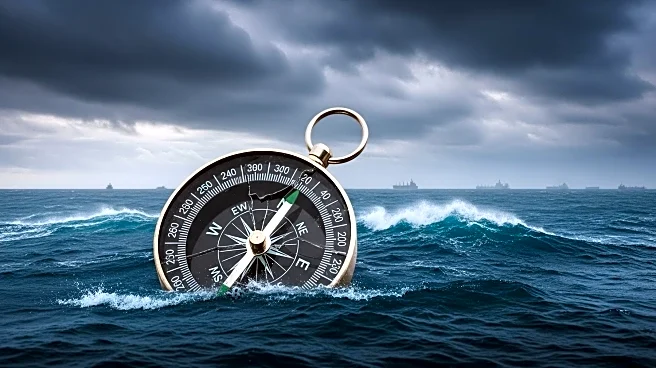What's Happening?
The Philippines has accused Chinese maritime forces of aggressive actions near the Philippine-occupied Thitu Island in the South China Sea. On October 12, 2025, a confrontation occurred when a Chinese coast guard ship reportedly used water cannon and rammed the stern of a Filipino vessel, the BRP Datu Pagbuaya, causing minor damage but no injuries. This incident is part of ongoing tensions between China and the Philippines over territorial claims in the South China Sea, a region vital for global trade. The Philippines Coast Guard and the Bureau of Fisheries and Aquatic Resources have vowed to continue their operations in the area to protect local fishermen, despite the aggressive actions from Chinese forces.
Why It's Important?
The South China Sea is a critical maritime region, with over $3 trillion in annual ship-borne trade passing through its waters. The escalating tensions between China and the Philippines could have significant implications for international trade and regional stability. China's expansive claims over the South China Sea are contested by several countries, including the Philippines, Brunei, Indonesia, Malaysia, and Vietnam. The recent incident underscores the fragile nature of peace in the region and highlights the potential for further confrontations that could disrupt trade routes and impact global markets. The Philippines' response to continue operations in the area reflects the importance of safeguarding national interests and the livelihoods of local fishermen.
What's Next?
The Philippines is likely to seek diplomatic channels to address the incident and may call for international support to counter China's aggressive maritime actions. The ongoing presence of Filipino vessels in the contested waters suggests a commitment to asserting territorial claims and protecting economic interests. China, on the other hand, may continue to enforce its claims over the South China Sea, potentially leading to further confrontations. The international community, including the United States, may be drawn into the dispute, given the strategic importance of the region and the need to uphold international maritime laws.
Beyond the Headlines
The incident raises broader questions about the balance of power in the Asia-Pacific region and the role of international law in resolving territorial disputes. The aggressive actions by Chinese maritime forces could be seen as a test of the Philippines' resolve and the effectiveness of international diplomatic efforts. The situation also highlights the challenges faced by smaller nations in asserting their rights against larger powers, and the potential need for multilateral cooperation to ensure stability and peace in contested regions.










